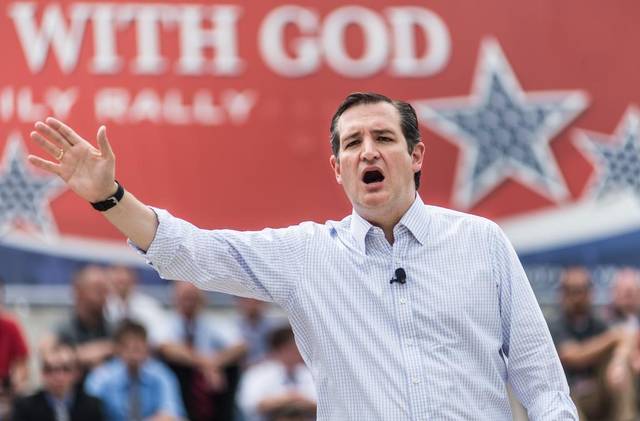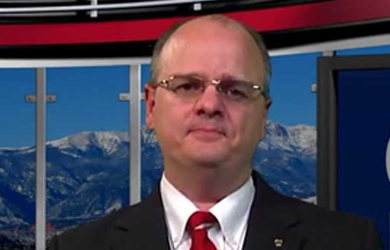The New York Times Magazine has a long article on the battle over textbooks in Texas and the related question of just how religious were the Founding Fathers and how much of a role they intended religion to play in our government.
The article is quite long, but I just wanted to highlight a few sections about the views and agendas of Texas Board of Education members Don McLeroy and Cynthia Dunbar:
I met Don McLeroy last November in a dental office — that is to say, his dental office — in a professional complex in the Brazos Valley city of Bryan, not far from the sprawling campus of Texas A&M University. The buzz of his hygienist at work sounded through the thin wall separating his office from the rest of the suite. McLeroy makes no bones about the fact that his professional qualifications have nothing to do with education. “I’m a dentist, not a historian,” he said. “But I’m fascinated by history, so I’ve read a lot.”
…
McLeroy is a robust, cheerful and inexorable man, whose personality is perhaps typified by the framed letter T on the wall of his office, which he earned as a “yell leader” (Texas A&M nomenclature for cheerleader) in his undergraduate days in the late 1960s. “I consider myself a Christian fundamentalist,” he announced almost as soon as we sat down. He also identifies himself as a young-earth creationist who believes that the earth was created in six days, as the book of Genesis has it, less than 10,000 years ago. He went on to explain how his Christian perspective both governs his work on the state board and guides him in the current effort to adjust American-history textbooks to highlight the role of Christianity. “Textbooks are mostly the product of the liberal establishment, and they’re written with the idea that our religion and our liberty are in conflict,” he said. “But Christianity has had a deep impact on our system. The men who wrote the Constitution were Christians who knew the Bible. Our idea of individual rights comes from the Bible. The Western development of the free-market system owes a lot to biblical principles.”
For McLeroy, separation of church and state is a myth perpetrated by secular liberals. “There are two basic facts about man,” he said. “He was created in the image of God, and he is fallen. You can’t appreciate the founding of our country without realizing that the founders understood that. For our kids to not know our history, that could kill a society. That’s why to me this is a huge thing.”
…
In 2008, Cynthia Dunbar published a book called “One Nation Under God,” in which she stated more openly than most of her colleagues have done the argument that the founding of America was an overtly Christian undertaking and laid out what she and others hope to achieve in public schools. “The underlying authority for our constitutional form of government stems directly from biblical precedents,” she writes. “Hence, the only accurate method of ascertaining the intent of the Founding Fathers at the time of our government’s inception comes from a biblical worldview.”
Then she pushes forward: “We as a nation were intended by God to be a light set on a hill to serve as a beacon of hope and Christian charity to a lost and dying world.” But the true picture of America’s Christian founding has been whitewashed by “the liberal agenda” — in order for liberals to succeed “they must first rewrite our nation’s history” and obscure the Christian intentions of the founders. Therefore, she wrote, “this battle for our nation’s children and who will control their education and training is crucial to our success for reclaiming our nation.”
After the book came out, Dunbar was derided in blogs and newspapers for a section in which she writes of “the inappropriateness of a state-created, taxpayer-supported school system” and likens sending children to public school to “throwing them into the enemy’s flames, even as the children of Israel threw their children to Moloch.” (Her own children were either home-schooled or educated in private Christian schools.) When I asked, over dinner in a honky-tonk steakhouse down the road from the university, why someone who felt that way would choose to become an overseer of arguably the most influential public-education system in the country, she said that public schools are a battlefield for competing ideologies and that it’s important to combat the “religion” of secularism that holds sway in public education.
Ask Christian activists what they really want — what the goal is behind the effort to bring Christianity into American history — and they say they merely want “the truth.” “The main thing I’m looking for as a state board member is to make sure we have good standards,” Don McLeroy said. But the actual ambition is vast. Americans tell pollsters they support separation of church and state, but then again 65 percent of respondents to a 2007 survey by the First Amendment Center agreed with the statement that “the nation’s founders intended the United States to be a Christian nation,” and 55 percent said they believed the Constitution actually established the country as a Christian nation. The Christian activists are aware of such statistics and want to build on them, as Dunbar made clear. She told me she looks to John Jay’s statement that it is the duty of the people “of our Christian nation to select and prefer Christians for their rulers” and has herself called for a preference for selecting Christians for positions of leadership.







